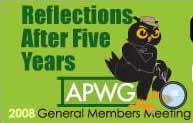On the agenda for APWG eCrime Tuesday 17 September 2013 in San Francisco:
Birds of a Feather (BOF)
Botnet Data Exchange for Botnet Node Remediation and Network Reputation Ranking
–Pat Cain, APWG
–John S. Quarterman, Quarterman Creations
I’ll be talking about
 among other reputational rankings.
among other reputational rankings.
APWG PR of 29 August 2013 says:

Global cybercrime-fighting association APWG is hosting its eCrime 2013 members meeting and research conference in San Francisco next month to launch its second decade of leading the global engagement with cybercrime, assembling commercial leaders from multinational technology and financial services companies, government and law enforcement agencies and industrial and academic researchers from around the world to update the global agenda for the long-term containment of the cybercrime scourge.This is the tenth year of APWG, and the seventh year of the eCrime Researchers Summit.
I presented at Continue reading


